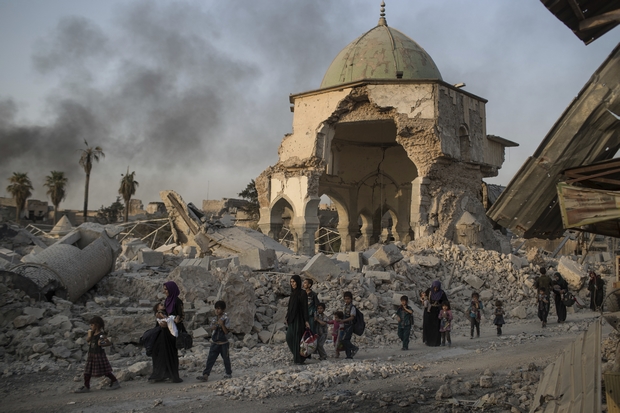
BAGHDAD: Iraq's prime minister has declared his country "liberated" from Islamic State and the terror group "evicted" after three years of brutal conflict.
"Our forces are in complete control of the Iraqi-Syrian border and I therefore announce the end of the war against Daesh," Prime Minister Haider al-Abadi told a conference in Baghdad on Saturday, using an Arabic name for the Islamist terror group.
"Our enemy wanted to kill our civilisation, but we have won through our unity and our determination. We have triumphed in little time."
A senior Iraqi military commander also said the country's war against Islamic State was over.
Lt Gen Abdul-Amir Rasheed Yar Allah said combat operations against the extremists had concluded after Iraqi forces retook control of the border with Syria.
An army statement said: "Iraqi lands are liberated from terrorist Daesh gangs and our forces completely control the international Iraqi-Syrian borders.''
IS fighters overran nearly a third of Iraqi territory, including Mosul, the country's second largest city, in the summer of 2014.
Over the past three and a half years, Iraqi ground forces backed by a US-led coalition have retaken all the territory once held by extremists, but the group remains capable of carrying out insurgent attacks.
The US-led coalition that has been supporting Iraqi force against Islamic State took to Twitter to offer congratulations.
"The Coalition congratulate the people of Iraq on their significant victory against #Daesh. We stand by them as they set the conditions for a secure and prosperous #futureiraq," said the tweet.
Last month Iraqi forces captured Rawa, the last remaining town under Islamic State control, near the Syrian border.
Mosul, the group's de facto capital in Iraq, fell in July after a gruelling nine-month campaign backed by a US-led coalition in which much of the northern Iraqi city was destroyed.
Islamic State's Syrian capital Raqqa also fell to a US-backed Kurdish-led coalition in September.
The forces fighting Islamic State in both countries now expect a new phase of guerrilla warfare, a tactic the militants have already shown themselves capable of.
Islamic State leader Abu Bakr al-Baghdadi, who in 2014 had declared in Mosul the founding of a new Islamic caliphate, released an audio recording on Sept 28 that indicated he was alive, after several reports he had been killed. He urged his followers to keep up the fight despite setbacks.
He is believed to be hiding in the stretch of desert in the border area.
Driven from its two de facto capitals, Islamic State was progressively squeezed this year into an ever-shrinking pocket of desert, straddling the frontier between the two countries, by enemies that include most regional states and global powers.
In Iraq, the group confronted US-backed Iraqi government forces and Iranian-trained paramilitary groups known as Popular Mobilisation.
Iraq now faces the daunting challenge of reconstruction. The fighting caused massive devastation in many areas, and some 3 million Iraqis are still displaced.